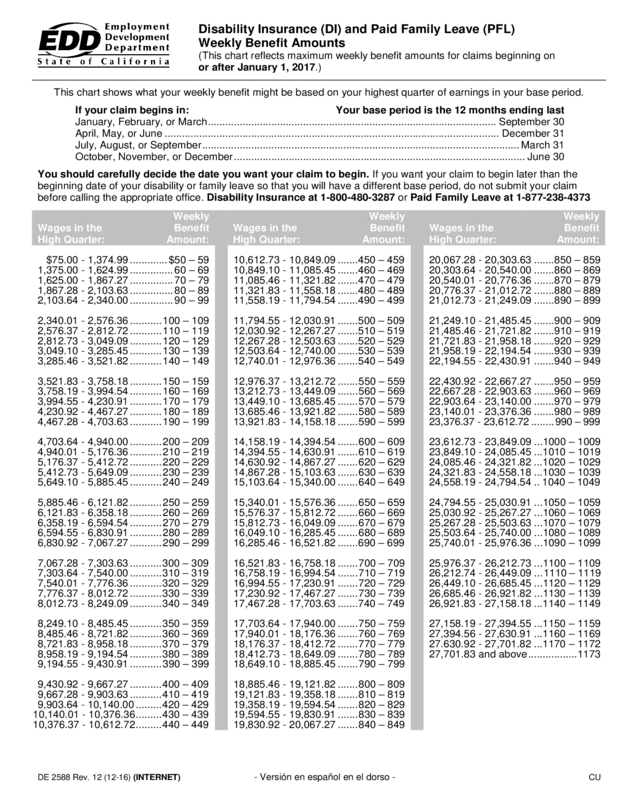Understanding the intricacies of the Employment Development Department’s (EDD) disability program is crucial for maximizing your benefit claims. The EDD provides partial wage replacement insurance plans for California workers, which can be a lifeline during periods of disability. However, navigating the system can be daunting, especially when dealing with the complexities of eligibility, application processes, and potential denials. This comprehensive guide is designed to walk you through the process, highlighting key strategies and insights to ensure you receive the benefits you deserve.
Eligibility Criteria: A Deep Dive
To qualify for EDD disability benefits, you must meet specific criteria. First, you need to be unable to work due to a non-work-related illness or injury. This includes both physical and mental health conditions, provided they are certified by a healthcare provider. Additionally, you must have earned a minimum amount in wages during a specific base period, typically the first four of the last five completed quarters before your claim begins. The exact amount can vary, so it’s essential to check the current requirements with the EDD.
Step-by-Step Eligibility Assessment
- Medical Certification: Ensure your healthcare provider understands the EDD’s certification process. They will need to provide detailed information about your condition, including how it affects your ability to work.
- Wage Requirements: Calculate your base period earnings. You can find this information on your pay stubs or by contacting your employer. The EDD website also offers tools to help estimate your potential benefits.
- Application Preparation: Gather all necessary documents before applying. This includes your social security number, California driver’s license or ID, and detailed medical records.
Application Process: Tips for Success
The application process for EDD disability benefits involves several steps, each requiring careful attention to detail.
- Online Application: The EDD recommends applying online for faster processing. Ensure you have all required documents ready and that your healthcare provider is prepared to submit the medical certification.
- Phone Application: If you prefer or need assistance, you can apply by phone. Be prepared for potential wait times and have all your information readily available.
- Follow-Up: After submitting your application, it’s crucial to follow up. Check your application status online or by phone to ensure everything is being processed correctly.
Maximizing Your Benefit Claims
To maximize your benefits, consider the following strategies:
- Detailed Medical Documentation: Ensure your healthcare provider includes as much detail as possible about your condition. This can affect the outcome of your claim.
- Regular Updates: Keep the EDD informed about any changes in your condition or employment status.
- Understanding Benefit Calculations: Your benefits are calculated based on your earnings during the base period. Understanding how this works can help you anticipate your potential benefits.
Common Challenges and Solutions
Despite the best preparations, challenges can arise. Here are some common issues and how to address them:
- Denial of Claims: If your claim is denied, you have the right to appeal. Gather additional evidence, especially from your healthcare provider, and submit it during the appeal process.
- Delays in Processing: Follow up regularly with the EDD. Sometimes, applications can be delayed due to missing information or backlogs.
Conclusion
Maximizing your EDD disability benefit claims requires a thorough understanding of the system, meticulous preparation, and proactive communication with both your healthcare provider and the EDD. By following the strategies outlined in this guide, you can navigate the process more effectively, ensuring you receive the support you need during a challenging time.
Frequently Asked Questions
What is the difference between EDD disability and workers' compensation?
+EDD disability benefits are for non-work-related illnesses or injuries, whereas workers' compensation is for work-related conditions. Understanding which one applies to your situation is crucial for the right benefit claim.
How long does it take to process an EDD disability claim?
+The processing time can vary, but typically, it takes a few weeks to a couple of months. The speed of processing depends on how quickly the EDD receives all required information, including your application and medical certification.
Can I work part-time and still receive EDD disability benefits?
+You may be able to work part-time, but your earnings cannot exceed a certain threshold. It's crucial to report any work or earnings changes to the EDD to avoid overpayment, which you might have to repay.
By navigating the EDD disability program with insight and care, you can ensure that you’re making the most of the benefits available to you, helping to secure your financial stability during a period of disability.


